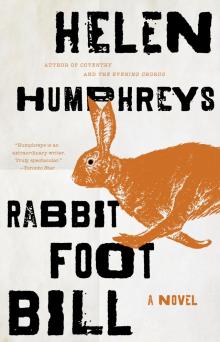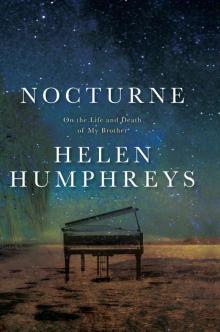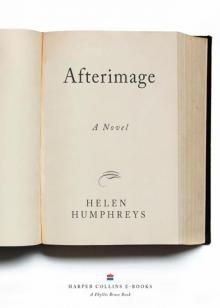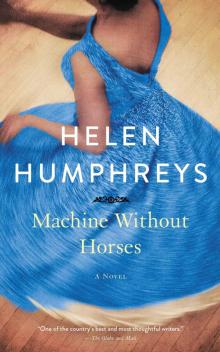- Home
- Helen Humphreys
Coventry: A Novel Page 9
Coventry: A Novel Read online
Page 9
Maeve thinks of this now, as she’s walking along the road, the city slowly dimming behind her. She has been happy with the rhythm of her days. It is not as though she’s greedy for happiness, but she wishes that she’d been able to recognize it completely when she had it.
Maeve remembers the light in the front room in the afternoon, how it crawled from the settee to the sideboard to the fireplace mantel. She remembers the creak on the staircase when Jeremy thudded down in the morning, the slower creaking as he ascended at night. She remembers the clink of milk bottles on the stone steps, the sputter of sausages under the grill. There was always a breeze in the garden when she was hanging out the wash. It filled the sheets as though they were sails.
These were ordinary moments. They were not filled with meaning, but they were Maeve’s life. Nothing that will come after tonight will be her known world. If she and Jeremy survive tonight, there will be the struggle of beginning again. This is hard enough at the best of times, but in the middle of a war it will be almost impossible to bear.
Maeve wipes the tears away that have started down her cheeks. She has slowed without realizing it, and is no longer keeping pace with Richard or the donkey. She has fallen behind. She is alone among this moving wall of strangers.
Harriet and Jeremy pass the fallen house of Mrs. Patterson and turn the corner. Harriet feels enormous relief at leaving her wrecked house behind. Wendell Mumby is buried under the rubble of it. It has become his grave. The invincibility she felt earlier in the evening seems to have evaporated. She thinks it is likely that Jeremy’s mother is dead too, and that she and Jeremy could be killed before the night is over. They are foolish to be out on the streets of Coventry when almost everyone else is hiding from the bombs. But when they were in that church basement earlier, Harriet had felt claustrophobic, and surely the cellars will be like ovens, with the city on fire above them. It feels better to be above ground, to be moving about, to see what is happening, rather than just imagining it. It would be better to die outside than trapped in a cellar with people she doesn’t like or know.
Jeremy’s street is perhaps five minutes away. Harriet does not know what will happen when they reach his house. If the house has survived, and he finds his mother, what will become of Harriet? Will he simply thank her for being his guide and expect her to disappear back into the night?
Harriet never wanted that much from her life, and what she did get was taken away. What will happen to her after this? Will she have to go back down south, throw herself on the mercy of her remaining relatives? She has been wilfully bad about keeping in touch with any of her family. She’s not even sure where anyone is except for her drunken father. Surely she won’t have to go and live with him again. How could she bear that?
Harriet looks over at Jeremy, walking beside her. She barely knows him, and yet he seems known to her. She likes his long limbs and the way, even when he’s hurrying out of danger, he ambles along. It’s reassuring to her. Harriet has not been in such accordance with anyone for as long as she can remember. An affinity, that’s what it is, she thinks. She feels an affinity with young Jeremy Fisher, and she badly wants to keep it.
There has been a pause in the bombing. Maybe it is over at last.
Harriet realizes that Jeremy has been speaking and she hasn’t been listening.
“What?” she says.
“I liked this place,” says Jeremy. “I thought we’d stay here. I liked my job at Triumph, and the house was close by, and Mum was looking into getting a job as a postman.” Women were now filling a lot of the traditionally male positions. One of the women Harriet used to work with at the coal merchants had left to become a welder because the pay was better and she fancied herself a sort of dragon, spraying fire over great sheets of steel. Everyone would have to stay out of my way is how she’d described it to Harriet.
They turn onto Jeremy’s street.
“Where are you?” asks Harriet.
“In the middle there, on the left.”
Mayfield has sustained much less damage than Berkeley. There don’t seem to be any houses down, just a few windows blown out and pieces of rubble scattered about the street, probably lifted there from bombs that have exploded nearby.
Jeremy’s house is standing. There is a window gone downstairs, and a door from some other house lying in the front garden. Harriet feels a wave of envy.
“You’re a lucky man,” she says, but Jeremy isn’t listening, is no longer standing beside her. He has bolted up the path, pushing open the front door, which swings easily off the latch.
“Mum,” he bellows into the interior of the house. “Mummy.”
The inside of the house is not in as good condition as the outside. The kitchen is a mess of smashed china. There are balls rolling around on the floor. It takes Harriet a while to get her eyes accustomed to the darkness in the kitchen and realize that the balls are really potatoes. There are bits of glass from the smashed front window in the sitting room. The hanging lamp in the front hall has come away from the plaster ceiling.
Jeremy has gone upstairs and Harriet follows him. She meets him on the landing. The finial on the stair rail comes off in her hand when she grabs it to steady herself.
“She’s not here,” says Jeremy. “No sign of her. I can’t tell how long she’s been gone.”
“She probably went to a shelter.”
“Or she wasn’t at home when the air raid started.” Jeremy drops down to sit on the top step. “She likes to go to the pub in the evening, to have a drink and draw in her sketchbook. I left home at four and she was here then, but she could have gone after that.”
“She’s probably safe,” says Harriet, thinking of Wendell Mumby, who is probably not safe, is probably squashed flat under the pile of rubble that their shared home has become.
“But what now?” says Jeremy. “Do I keep looking for her? Do I stay here?” The building shakes from a nearby bomb blast and plaster dust falls from the ceiling like flour sifting down. The raid is certainly nowhere near over. If anything, the frequency of the bombing has increased in the last little while.
“Stay here,” says Harriet. She only knows that she doesn’t want Jeremy to leave her. “We could stay here until morning, and then we could do a proper search for your mother. It will be hard to find her in the dark if we don’t know where to look.”
Harriet drops down beside him on the stairs. Their legs are touching.
Jeremy cocks his head to one side and looks at her. “All right,” he says. “We’ll stay.”
In the silence Harriet can hear the trickling of plaster down the wall behind them.
“Would you like something to eat?” says Jeremy. “I’m forgetting my manners.”
“No, thank you,” says Harriet. She pauses. “Do you have manners?” she asks.
“I do.”
“Do you have a girl?”
“No.” Jeremy shifts on the staircase and moves, ever so slightly, toward Harriet. “I told myself I was in love with Lily Palmer, but she didn’t love me back. She went with a pilot. I can’t really compete with the RAF.” He smiles.
“How old are you?” asks Harriet.
“Twenty-two.”
“That’s half my age, exactly.”
“You don’t look over forty,” says Jeremy.
“You haven’t seen me in daylight.”
They are quiet again. Harriet feels suddenly shy.
Jeremy takes her hand. “I keep thinking of that woman in the park.”
“So do I.”
“Is there blood on me?” he asks.
“Up near the collar and a bit on the sleeve. Here.” She moves her other hand, the one not holding his, and turns the piece of overall sleeve above his wrist so that he can see the patch of blood. They are turned toward each other now, close enough to kiss. The thought frightens her so much that she drops Jeremy’s hand.
“You said the pub around the corner was where your mother went?”
“Yes.”
&nb
sp; “Let’s go and look for her,” says Harriet, standing up.
The Coachman is still standing. The front door opens to a touch. The bar is empty and the fire is out, but Harriet can see the pint glasses on the tables in the moonlight from the open door. They are covered with dust.
Jeremy finds the door to the cellar at the back of the pub and wrenches it open. They can hear voices down there, see the stuttering light from candles.
“Hello,” calls Jeremy as they begin their descent. “Hello.”
The cellar is small and damp. The knot of people in the centre of the room are quiet as Harriet and Jeremy come down the staircase.
“We’re a bit full, mate,” says one of the men, finally.
“We’re not wanting to stay,” says Jeremy. “I’m looking for my mother. She might have been here earlier?”
“There was a woman here when the sirens first started,” says another man. “She was sitting by herself in the pub, drawing pictures.”
“That’s her,” says Jeremy.
“Said she was going home to her son,” says the man.
When they get back to the house, Jeremy stands for a moment in the front hall, absorbing the stillness of the building.
“God,” he says, looking down at his sleeve. “I still have that woman’s blood on me. I can’t stand this. I’m going to go and change.” He bounds up the flight of stairs and disappears into his bedroom.
Harriet can’t help following Jeremy. She doesn’t want to be separated from him now. She stands in the doorway to his room, watching him unbutton his overalls. The moonlight slanting through the bedroom window makes everything look milky.
It’s a boy’s room, not a man’s room. There is a cricket bat leaning against a wall and shelves holding toy cars, even a line of soldiers marching across the window ledge. There is a teddy bear on the bed, leaking straw through its belly.
Jeremy has unbuttoned the uniform but hasn’t removed it yet. He looks over at Harriet standing in the doorway. She has to think quickly.
“What’s the most precious thing you have?” she asks.
“That’s worth the most?”
“That means the most.”
Jeremy walks over to the window ledge and takes a small object from there, brings it over to Harriet at the doorway.
The tiny coal fire on three miniature legs glows red from some combination of paint and a sparkly stone. Perhaps mica, thinks Harriet, remembering suddenly the page of minerals in a book on geology that she once looked at in the library.
“It’s supposed to warm the soldiers in the sentry box,” says Jeremy. “They come together as a sort of set, the sentry box and the fire. When I was a boy I just moved my soldiers around the fire, to warm them up.” He looks at the coal fire, burning in the palm of his hand. “I don’t know why I like it so much,” he says. “But it’s sort of perfect, I think.”
“It’s almost like a jewel,” says Harriet.
“Yes,” says Jeremy. He holds it out toward Harriet. “Here,” he says. “You have it.”
“No, I didn’t mean that,” she says. “I don’t want anything.”
“You have it,” says Jeremy. He presses it into her hand, closes her fingers over it. “So you’ll remember me.”
“How could I forget you?” asks Harriet.
Jeremy puts his hands gently on Harriet’s shoulders. “I don’t know what to do,” he says. “Tell me what to do.”
Harriet can feel her heart ticking in her chest. “Do what you want to do,” she says.
Jeremy hesitates for only a moment, obediently struggles his arms from the sleeves of his overalls. They slide down his body, drop onto the floor.
Their embrace is awkward and desperate. They stumble onto the bed. When Jeremy kisses Harriet, he tastes of smoke. He tastes of the burning city.
Harriet’s overalls are still attached by one ankle. Jeremy’s socks are on, and his underpants are pulled down around his knees. The bed is narrow and Harriet’s head knocks against the headboard for the few thrusts that Jeremy manages before he shudders to a stop, lying heavy and damp on top of her.
There is a moment of complete calm. A moment when Harriet can see the light changing in the bedroom window over Jeremy’s shoulder. Now it looks like a saucer. Now it looks like the prow of a ship.
She runs her hands over Jeremy’s back, feeling the joinery of spine, the latch of ribs. He doesn’t say anything, and it takes Harriet a moment to realize that he has fallen asleep. She feels completely exhausted too, but she doesn’t want to sleep through this moment.
Harriet knows Jeremy is awake when she feels his body stiffen. He doesn’t look at her, struggles up, off the bed. “I should go.”
“No, don’t go. Please.”
Jeremy is hastily pulling on trousers. He walks over to the wardrobe to get a shirt. “I should go back out and help the others. I should go back out to Marjorie Hatton’s aid station and help her. I’m sure my mother must be safe, wherever she is, and I’ll find her here when the raid’s over.” He puts on a shirt, doesn’t stop to button it up, bends down to tie his shoes. “Think of that poor woman in the park, and the old man buried under the rubble.”
Old man. The dead man with the medals on his chest from the last war had been barely older than Harriet.
“Jeremy,” she says, but he doesn’t look over at her, doesn’t stop to answer her. He laces his shoes and bolts from the room.
Harriet lies on the bed, listening for the sound of the front door opening and closing. The small fire, curled tight in her fingers, feels as though it is burning a hole through her skin.
She feels as though it is her fault that he has left, embarrassed at what has happened between them. She wants to run after him, make him come back to her; but Jeremy doesn’t owe her anything. He’s not obligated in any way. They were together this evening because they chose to be, and now he has chosen to go off alone. Harriet has to let him.
Harriet thinks of Owen, how she always saw him as a man when they were together—because she was young then too, because she looked up to him. But now she can see how he, too, was still only a boy.
Harriet has been out with only one other man after Owen. It was about five years ago, and it didn’t last long. His name was Stanley, and he was the younger brother of one of her bosses. He had come to town for a visit and she had been invited to have dinner with the whole entourage of wives and bosses. It was a set-up; she’d known it from the start. It may even have been presented to her that way by Mr. Bartlett. Stanley is alone, and I know you are too, Harriet. The dinner was bearable because there were so many people there that Harriet didn’t really need to talk to Stanley, but afterwards he offered to walk her home and she felt she had to oblige him. He wasn’t in the coal business, which was a relief as Harriet found the coal business rather boring. Stanley had moved away from the family enterprise. He’d become a law clerk, although he seemed to fancy himself a proper barrister. They walked through the streets and he regaled Harriet with points of law that she couldn’t care less about. He never asked her a single question about herself, and when they got to the wall outside her flat he pressed himself against her and pushed a hand up her skirt.
“What are you doing?” she had said, wriggling away from him.
He looked affronted at her non-cooperation. “You’re a widow,” he said. “It’s what you want.”
“It’s not what I want at all,” she said.
“But how can you not want a man’s attentions?” asked her friend Daisy, several years after Owen’s death.
Harriet couldn’t explain that she didn’t really feel like having a physical relationship with anyone. She felt lonely, but she blamed it on Owen dying. It was as though love and sex was a room she had once entered, and now she had simply left that room, turned off the lights, and gently closed the door. It didn’t feel as though she had given up anything. It had given her up.
Harriet stands in front of Jeremy’s house, looking up at the window of his bedroo
m. She opens her hand, looks at the small soldier’s fire lying there, and then tucks it into the pocket of the coat she has borrowed from a peg in the hallway and begins walking.
Harriet can’t go back into the city. It makes no sense to do that. She knows how much damage is there, how hard it will be to find shelter; so she decides she will head in the other direction instead. She leaves Jeremy’s street and turns toward Warwick Road, one of the main thoroughfares of Coventry that leads into the countryside. She will walk out of the city.
These are the drawings that Maeve has wanted to make but hasn’t been able to: the shoe that dangles from her mother’s foot when she sits with her legs crossed, how provocative it seems, and how that one gesture doesn’t match anything else about her character. The mother who did not accept her for who she was.
The dead hedgehog she found in the garden last week. There were no marks on its body, and it was still standing up, as if it had been walking along the ground and had simply died.
Her own face in the dressing-table mirror in her bedroom. She has actually tried to do this before, has spent a week attempting a self-portrait. Every day for a week she sat down on the stool embroidered with roses in front of her dressing table and drew lines on the page, looked up at the planes of her face, looked back down to the paper. Each self-portrait had looked nothing like the next and that had surprised Maeve. She had always thought of herself as remarkably constant. The drawing had showed her that perhaps she was adaptable, and that, when the moment changed, she was able to change with it.

 Rabbit Foot Bill
Rabbit Foot Bill Nocturne
Nocturne The Ghost Orchard
The Ghost Orchard Afterimage
Afterimage The Frozen Thames
The Frozen Thames Coventry: A Novel
Coventry: A Novel Machine Without Horses
Machine Without Horses The Lost Garden: A Novel
The Lost Garden: A Novel The Reinvention of Love
The Reinvention of Love Helen Humphreys Three-Book Bundle
Helen Humphreys Three-Book Bundle